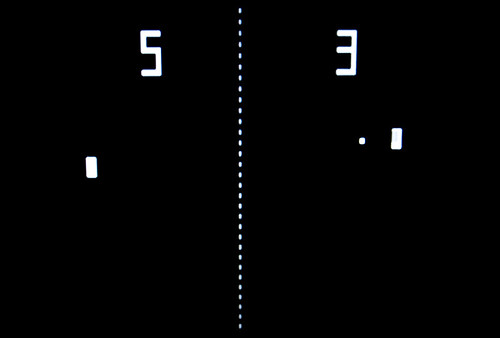[Photo: CC BY-NC-SA 2.0 by Terry Pritchard]
Forty years ago today, Atari released Pong, that ridiculously simple video game that paved the way for an entire industry and, for some, a lifestyle. In celebration, we’ve gathered ten of our favorite gaming words here.
chiptune
“Having germinated in the hacker stronghold of 1980s Scandinavia, chiptune music has become a worldwide scene with no clear geographical center. Perhaps the ultimate musical form for hackers, the international chiptune scene spawned directly from the cracking of copyright protection.”
Eliot Von Buskirk, “‘Chiptune’ Bands Blitz New York for Blip Festival,” Wired, November 28, 2007
Chiptune refers to “a piece of computer music in which the sounds are generated and mixed in realtime, common in the 1980s before the advent of mass storage for prerecorded sound.” The term seems to have originated in the 1970s or 1980s.
Other video game music genres include fakebit, Game Boy music, bitpop, Nintendocore, and skweee.
frag
“And how does it feel, Julia,” Oprah Winfrey soon purrs, “when you… what was that again? When you ‘frag’ someone?”
Wagner James Au, “Deathmatch: Julia Roberts-style,” Salon, June 23, 2003
To frag means “to kill (another player) in a deathmatch computer game.” Deathmatch refers to “a competitive mode found in first-person shooter games in which competitors attempt to assassinate one another.”
Frag probably comes from another sense of the word, “to wound or kill (a fellow soldier) by throwing a grenade or similar explosive at the victim,” which comes from fragmentation grenade, “a grenade that scatters shrapnel over a wide area upon explosion.”
griefer
“A griefer is a person who likes to cause problems for the sake of causing them. As the criminals of the virtual world, their goal is to make virtual life miserable for the other player. Depending on the environment, the mischief can come in the form of player killing, vandalism, player trapping or taunting.”
Nicole Girard, “Griefer Madness: Terrorizing Virtual Worlds,” Linux Insider, September 19, 2007
A griefer is “a player who plays a game primarily to reduce other players’ enjoyment of it.” The terms seems to have originated in 2000 or earlier, “as illustrated by postings to the rec.games.computer.ultima.online USENET group,” while griefing is older, dating back to the late 1990s. The word grief comes from the Old French grever, “to harm, aggrieve.”
Related is ganking, in gaming, “to kill, ambush, or defeat with little effort,” as well as “to swindle; to steal; to copy, reproduce, reuse, or save an image, idea, or work of another person, often in the context of materials posted on the Internet.”
hack-and-slash
“Using an improved version of the conversation mechanism from Mass Effect 2 and battles that demand strategic thought alongside the more usual hack-and-slash technique of repeatedly battering the ‘attack’ button, Dragon Age 2 manages an impressive story to complement its more involved combat.”
Nick Gillett, “This Week’s New Games,” The Guardian, March 11, 2011
Hack-and-slash refers to a game or movie that focuses on violence and combat. According to the Oxford English Dictionary, the gaming term seems to have originated first, in the late 1970s, while the film term came about in the mid-1980s.
Slasher movie seems to be more specific than a hack-and-slash in that it depicts “the activities of a vicious attacker whose victims are slashed with a blade,” says the OED. Slasher originally referred to snuff films, and came to its more mainstream definition in the 1980s.
ludology
“Game studies (or ‘ludology,’ as it’s known, from the Latin for ‘game’), has spawned a new class of academics who devote themselves to analyzing how the wildly popular form of entertainment tells stories — and what it reveals about how we express ourselves.”
Nick Wadhams, “Academics Turn Their Attention to Video Games,” USA Today, February 13, 2004
Ludology is “the study of games and other forms of play,” and comes from the Latin ludere, “to play,” which gives us ludicrous, “laughable or hilarious because of obvious absurdity or incongruity.” Game comes from the Old English gamen, “game, joy, fun, amusement.”
[Photo: CC BY-NC-ND 2.0 by Lainy Voom]
machinima
“In the cash-strapped world of low budget movies, many see machinima as a cheap way of getting their ideas on screen. The technique involves recording footage from games consoles and editing shots together to tell stories.”
Peter Price, “Machinima Waits to Go Mainstream,” BBC News, October 16, 2007
Machinima, a blend of machine and cinema, “the rendering of computer-generated imagery using low-end (real time) 3D engines such as those found in video games, as opposed to the high-end, complex 3D engines used by professionals.” According to the OED, the word originated around 2000 and may be influenced by the word anime.
MMORPG
“Designing an MMORPG is a unique creative challenge. The initial game universe can take up to five years to build and often requires the formation of a complex mythology to provide and maintain its narrative thrust through future add-ons and expansion packs.”
Keith Stuart, “World of Warcraft Cataclysm,” The Guardian, July 15, 2010
MMORPG stands for massively multiplayer online role-playing game, “an online computer role-playing game in which a large number of players can interact with one another.” A precursor is the MUD, or multi-user dungeon, “a text-based command line online game in which players may jointly engage in role-playing.”
nerf
“Across the roster the Japanese company has resisted the temptation to nerf powerful characters (Sagat and Ryu), and instead tried to make established lower to mid tier characters more viable.”
“Super Street Fighter IV Preview,” Video Gamer, March 22, 2010
To nerf means “to water down, dumb down or especially weaken, particularly in the context of weapons in video games,” coming from Nerf brand foam rubber toys, known for being relatively safe. The opposite of nerf is buff, to make a character stronger.
pwn
“‘Some common [gaming] words originated as typos when people are typing fast during a game,’ says Chandronait. A popular word used by gamers is ‘pwn,’ which means ‘to own’–as in ‘you are better than’ or ‘own’ another player. Chandronait suspects ‘own’ probably turned to ‘pwn’ because the p and o keys are adjacent on a standard keyboard, and gamers, during their quick typing, simply hit the wrong key.”
Anna Vander Broek, “Gamer Speak for Newbs,” Forbes, April 23, 2009
Another popular theory of the origin of the word pwn is that “the term originated back in the 1930s in the world of chess when a Russian competitor’s accent changed ‘I will pawn to your knight’ to ‘evil pwn you tonight.’”
zerg
“In some multi-player games, ‘zerging’ has come to refer to a gamer who, often against the game’s rules, creates multiple accounts to get an unfair advantage over other players.”
Doug Gross, “‘Zerg Rush’ Chews Up Google’s Search Results,” CNN, April 27, 2012
To zerg is “to attack an enemy with a large swarm of units before he/she has been able to build sufficient defenses.” The word comes from the game StarCraft and its Zerg race of insects which operate “as a hive mind. . .[striving] for genetic perfection by assimilating ‘worthy’ races into their own, creating numerous different strains of Zerg.”
As for what typing “Zerg rush” into Google does to your search results, give it a try.





